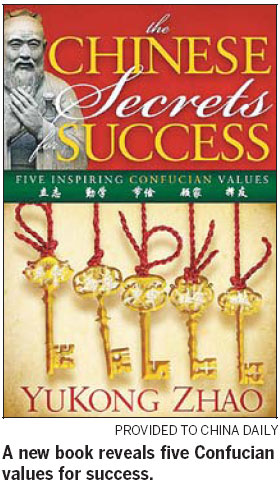
When Yukong Zhao was looking into purchasing investment properties in 2009, the director of China business development at Siemens met some Americans who had lost their homes. As he spoke with them, he realized that they had never prioritized saving money, a financial principle that was for him entirely instinctive. He began thinking about what he calls "Confucian values", and how they had shaped his attitudes toward money and life.
In The Chinese Secrets for Success: Five Inspiring Confucian Values, Zhao presents an outline of those tenets for American and Chinese audiences.
"I wrote this book for the many Americans who, like me, believe in 'American Exceptionalism', but also recognize that their lives can be further improved by learning from the strengths of other cultures," he writes in the book's introduction. "More specifically as a Chinese-American, I wrote it to offer inspiration and proven solutions drawn from my cultural heritage to Americans seeking ways to deal with the tough challenges in their lives: impact of the financial crisis, rising global competition, decline of American education and lack of financial security."
Zhao, who grew up in Yunnan province and emigrated to the United States in 1992, says financial stability is at the core of the Asian-American community's current status as "the highest-income, best-educated and fastest-growing racial group in the US", according to the Pew Research Center.
Sixty percent of Americans don't have savings above $25,000 to support themselves or their families in retirement, he says. While Chinese have long looked to the West for inspiration, and most immigrants to the US embrace various Western values including equal rights and independent thought, their continued adherence to Eastern values have contributed to their relative success, he says.
Li zhi, the last tenet, is translated informally to mean having ambitious dreams and goals. He views a lack of motivation and drive to be at the core of why US teenagers have fallen so far behind on the OECD Global Education Assessment Report.
Younger generations in China are also being affected by what Zhao believes to be the problems of modernization. A focus on materialism and pop culture has in some cases replaced the drive for a better education and stable family dynamics, an erosion of cultures that seems to be happening everywhere, he says. But Chinese-Americans remain relatively successful in the areas of education and financial stability, he notes.
"It's the combination of positive values drawn from Confucianism and Western culture that make many Chinese/Asian Americans successful in their pursuit of the American Dream," he writes.
"I want to remind Chinese people that our heritage is worth preserving, and I think Americans could gain from being a little more open to other cultural values. In a way, that also means returning to true American values, like an ethic of hard work and family."
|
|
|
|
|
|
|
|
